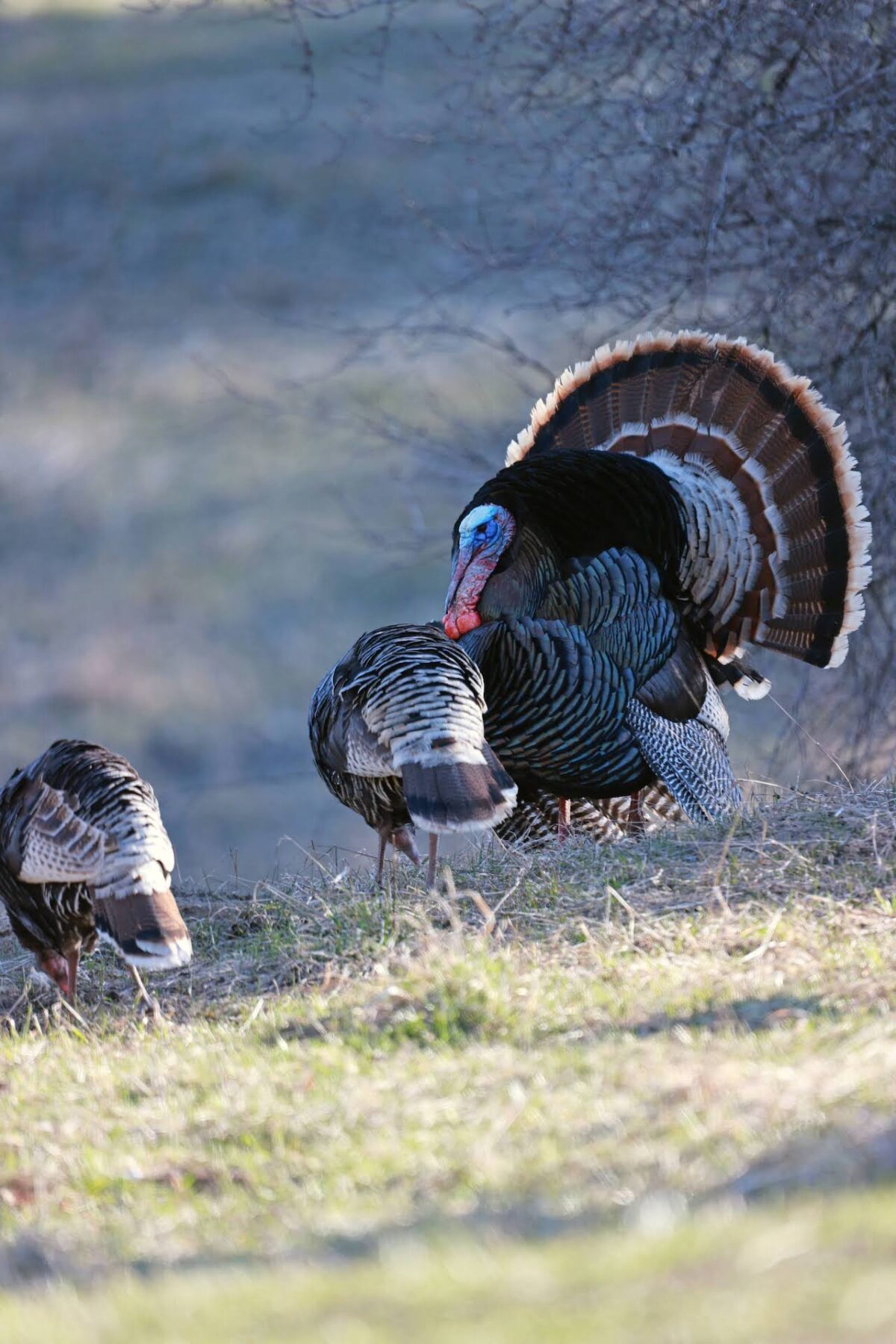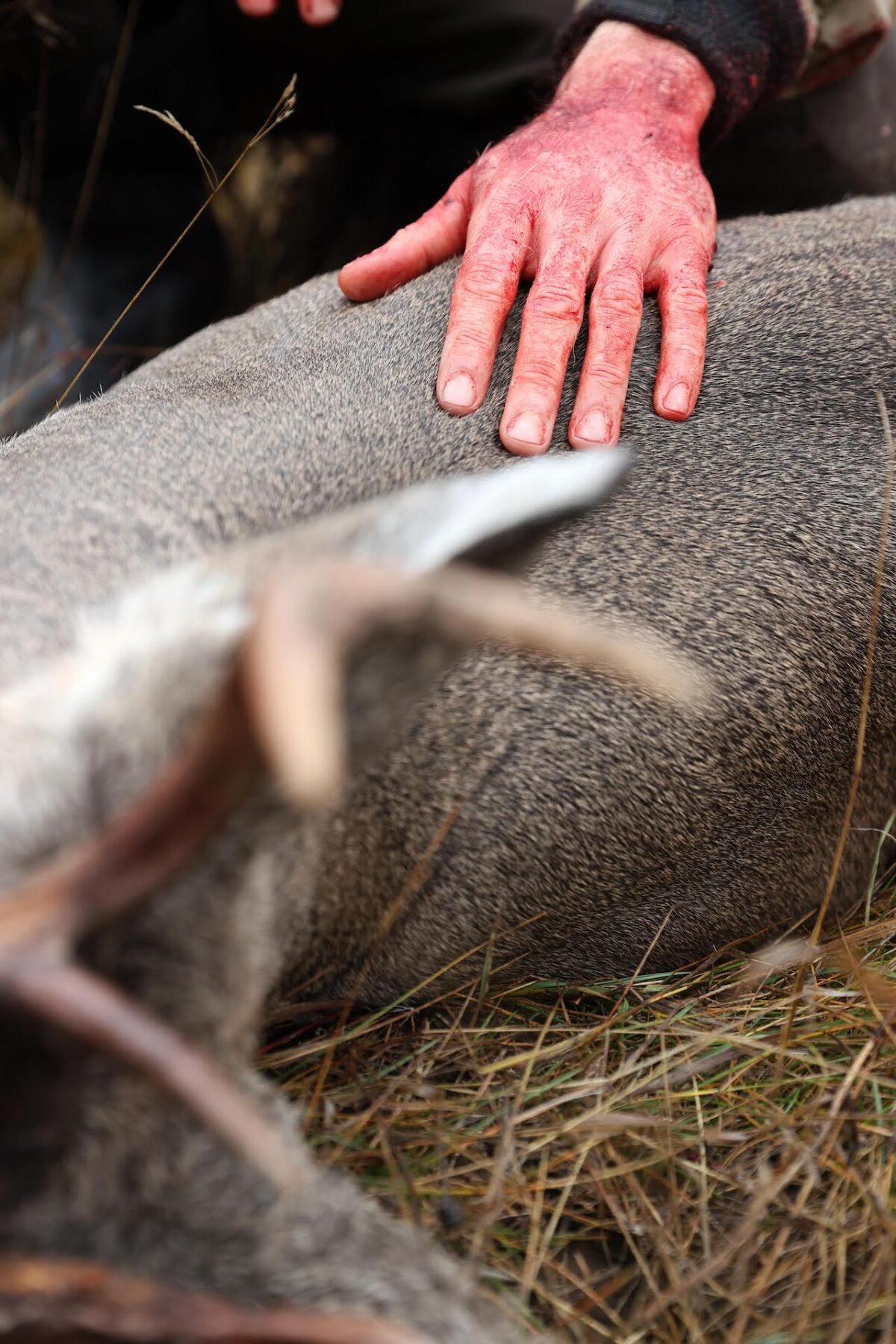Think tank’s deep dive into ‘dysfunctional’ Washington Fish and Wildlife Commission might be used by legislature to dissolve the citizen oversight panel instead of correct recent years’ issues.
By Jillian Garrett
If you haven’t already heard about the recently completed Ruckelshaus report, you are going to get very familiar with it in the coming months. It will play a major role in the continued battle over Washington wildlife management, and the decisions made based on this report will have far-reaching consequences for the future of hunting, angling and trapping as we know it.
But first, a little bit of backstory …

THE RUCKELSHAUS REPORT has its origins in the $23 million bipartisan biodiversity funding package that Washington legislators granted the Washington Department of Fish and Wildlife in April 2023. Seemingly at the last minute, a rider was attached to that biodiversity bill – like a legislative lamprey on a salmon – to provide a $300,000 grant to review WDFW’s governance structure, funding model, mandate and, most importantly, the Fish and Wildlife Commission. This rider, designated 32(b) on page 430 of the passed 2023-25 operating budget, wasn’t in the initial proposals from the House and Senate, and came as a shock to many of the organizations that had previously supported the biodiversity package.
Dan Wilson, board co-chair for the Washington Chapter of Backcountry Hunters and Anglers, said, “It is beyond disheartening that the efforts of so many (to pass the biodiversity bill) were co-opted by a fringe element that seeks to undermine the Department of Fish and Wildlife and its people through a reform movement targeting the most successful model of wildlife management in the world. Beyond that, it is truly a shame that critical dollars needed for our most imperiled species are being diverted to serve the special interest agenda of myopic activists willing to go to the extreme.”
The origins of that bill rider do indeed seem suspect, as one doesn’t exactly push through an expensive study without plans to do something with it. In fact, about a month prior to the passage of that bill, Washington Wildlife First and 49 other preservationist affiliates sent a letter to the state’s budget writers requesting that $300,000 of that biodiversity package be earmarked for a “WDFW Accountability and Reform Study,” which these groups wanted to be performed by the Washington State Institute for Public Policy, run by Evergreen State College in Olympia. In the end, lawmakers instead chose Washington State University and the University of Washington’s William D. Ruckelshaus Center for the review, but they folded much of the draft language from that letter straight into the final budget rider – except with an even firmer imperative to come up with recommended changes.
Organizations like WWF have long advocated for massively reforming the way that the state manages its fish and wildlife. According to WWF’s founder, Claire Davis, the organization has already been “very involved in the commission appointment process and working with the Fish and Wildlife Commission to bring about better policies,” yet their push to include the bill rider would suggest that they are still looking for further methods of restructuring the current system of management.
While the report’s 75 pages are well worth a general perusal, the gist of the analysis will come as no surprise to anyone familiar with the last few years of Washington’s wildlife management politics: The Fish and Wildlife Commission was deemed to have “dysfunctional elements” and a “lack of accountability.”
What really matters to consumptive users can be found in the three recommendations put forth by the Ruckelshaus report for dealing with a “dysfunctional” commission:
1) Do nothing (“Maintain the Status Quo”);
2) Dissolve the commission, create a governor-appointed director, and turn the WDFW into a cabinet agency;
3) Or keep the commission, but with comprehensive reforms to address the issues with it.
Let’s take a look at these options and see what the consequences of implementing each might entail.

OPTION 1: DO NOTHING
Anyone who has been following the antics of the commission for the last few years will understand that this is not a recommendation so much as a front-row seat to an inevitable train wreck. By allowing the commission to maintain the status quo, we will only see more of the same “dysfunctional elements” identified by the review. Without changing anything when it comes to adding in guardrails or some form of accountability, it’s unreasonable to expect to see the commission alter its behavior in the future without the “comprehensive reform” suggested by the Ruckelshaus report.
If history has taught us anything, it’s that allowing the commission to continue as-is will lead to further increases in polarization, lost hunting/angling/trapping opportunities, poor wildlife management decisions (such as in the case of the Blue Mountains elk herd), lack of transparency, conflicts of interest and even more contention when it comes to commissioner appointments. (Terms of three members, including two hunter- and angler-friendly commissioners, technically ended December 31, though they can continue to serve until replaced.) If left unchecked, the commission will continue to berate and lose valuable staff and scientists, and petitions (such as the one around cougar hunting regs) could potentially become the new norm for deciding wildlife management.
Doing nothing will continue to result in ongoing contention between the commission and the tribes, as was seen with the draft Conservation Policy, as well as a general tendency to ignore the Boldt Decision, which recognizes the sovereignty of tribal governments and their treaty right to have an equal say in salmon and steelhead management decisions. In fact, the Ruckelshaus report noted that interviewees thought it troubling and inappropriate that the commission attempted to engage with tribes using the same methods that it used for the general public (such as through public comment periods), instead of recognizing that tribes are not stakeholders but in fact sovereign governments requiring government-to-government consultations.
The longer someone or something remains in power without accountability, the more egregious their behavior tends to become. Doing nothing won’t fix any of the current problems, and in fact may result in an eventual implosion of the commission if it continues along this path, with devastating impacts to both wildlife and the cultural values – including consumptive use – of the state’s constituents. While we really didn’t need the Ruckelshaus report to tell us any of this, it’s at least an official confirmation that something needs to change. The question is: How – and how much?
OPTION 2: DISSOLVE THE COMMISSION, CREATE A GOVERNOR-APPOINTED DIRECTOR, AND TURN WDFW INTO A CABINET AGENCY
This is the most extreme – as well as most alarming – recommendation. It calls for a radical revision in how WDFW is structured and funded. In essence, it would completely dissolve the commission and instead put the decision-making for all wildlife policies into the hands of a single governor-appointed director. WDFW, instead of maintaining its current autonomy, would be morphed into a cabinet agency, thus be forced to compete for funding with dozens of other agencies in the governor’s cabinet.
Currently, members of the commission are all appointed by the governor and can only be recalled by the governor. Without a better process for vetting potential appointees, it is all too easy for seats to be filled based on political influence as opposed to legitimate qualifications. In that same style, a governor-appointed director could potentially be even worse, as there would not be other commissioners to help keep what little balance remains in check, and all the policies and regulations that are currently set by our commission would now instead be in the hands of one director. As politicians generally loathe being wrong, removal of a “problem” director by the governor could prove very difficult, meaning that there may not be an effective mode of authority for addressing issues with an appointment.
Additionally, it would be far too easy for well-funded preservationist groups to do political campaigning and influence the governor’s pick, thus manipulating wildlife management decisions for the foreseeable future and removing representation from Washington’s diverse constituents. As Claire Davis stated after the Ruckelshaus review rider was approved, “That solves a lot of these problems for us,” in reference to reforming the current system of management into one with more oversight from elected official(s).
Currently, Washington’s politics tend to be decided by just a few populated counties, while the effects of those decisions are felt by all residents, including its rural ones (who also tend to be the most impacted by wildlife management policy). The commission’s present structure calls for three commissioners to be from west of the Cascades, three from east of the mountains and three “at large,” with no two members residing in the same county. Theoretically, this helps to increase the representation of Washington’s residents, including those living in the more remote eastern areas. That representation would be effectively eliminated if the commission was dissolved and replaced with a single director.
Meanwhile, morphing WDFW into a cabinet agency would force it to compete for funding with more than 20 other agencies, drastically decreasing its autonomy for budget (as well as management) decisions. Numerous interviewees for the Ruckelshaus report spoke against this option, citing how it can be beneficial to remain independent of the Governor’s Office, including having greater flexibility to make budget requests, work with individual legislators and maintain better involvement with the public and special interest groups.
Though a few states have already gone the route of rolling their wildlife management into a cabinet agency with a single governor-appointed director (Utah is one example that comes to mind), none – at least to my knowledge – did so at the elimination of their wildlife commission. This makes sense: Commissions are there to provide a system of checks and balances, which would be sorely needed with a single politically appointed position such as this. The fact that Washington would be removing that form of oversight entirely is cause for serious alarm. To drive the point home: Imagine your least favorite commissioner as the new director, answerable to no one except the governor when it comes to regulating wildlife policy.
While current Washington’s Fish and Wildlife Commission was first implemented in the mid-1990s, the actual structure of wildlife commissions was fashioned as far back as the 1930s. It came about as part of the Model Game Law, which outlined a basic system for establishing state commissions and giving them power over policy, budget and selection of an administrative director who would be free to carry out those policies and programs as decided by the commission. The commission would be made up of a panel of dedicated citizens who served staggered terms, thus helping to insulate wildlife management decisions from swings in politics and provide overall stability – something that is sorely needed when it comes to the successful implementation of wildlife conservation research and habitat restoration projects.
It’s a telling fact that only about three states currently lack a wildlife commission. When structured correctly – and with the necessary modes of accountability in place – commissions are an effective way to avoid the undue intrusion of politics into management, ensure citizen and tribal participation and representation in establishing policy, and maintain stewardship of the resource.
To quote Commissioner Stephen Parker of Yakima during a recent commission meeting, “The first step in collaboration is to recognize that there are other windows and that the view from those windows is just as important to the people looking through them, and that we not insist that everybody look out the same window.”
Without a commission structure left in place, we lose oversight, broad-scale representation and hope for collaboration on state wildlife issues. It’s important to note that Ruckelshaus only advises utilizing this option as a last resort, if “there is not sufficient political will or interest” in making the reforms outlined in the next option.

OPTION 3: KEEP THE COMMISSION, BUT WITH COMPREHENSIVE REFORMS TO ADDRESS THE CURRENT ISSUES
This option would keep the commission intact but would institute immediate reforms to address the current issues relating to items such as governance, transparency and accountability. Out of all the recommendations put forth by the Ruckelshaus report, this one conceivably has the best chance for the long-term success and stability of Washington’s wildlife, as well as the continuation of the cultural values of its people.
This option would call for clarifying and modifying the commission’s overall function in governing, removing it from getting lost in the weeds of day-to-day operations and instead returning it to the role of providing direction only on high-level policy. This would mean overseeing whether regulations aligned with the department’s overarching goals and policies while leaving the actual setting/changing of game management rules to WDFW. Modifying the commission’s function in this manner would help eliminate many of the issues that have angered consumptive users over the last few years.
When it comes to accountability, it would mean reforms to establish protocols for guiding communication between commissioners and the department director and staff. For example, clarifying whether commissioners can make direct requests for information from department staff; that commissioners are not allowed to direct department staff to do specific work, nor can they request that the department director fulfill individual preferences for action. It would also include establishing protocols for how commissioners communicate with and treat department staff in public (as well as private) meetings.
Reforms would include the need for more clearly defining the roles and authority of the commission, as well as establishing processes for mediating conflict between individual commissioners and between the commission and the department. It would also include criteria for establishing clear pathways when it comes to the removal of commissioners. For accountability to truly matter, there needs to be a way to hold commissioners to the code of ethics and behavior that are already stated in their Rules of Procedure.
This option would also entail establishing better criteria and a more thorough vetting process for commissioner appointments, such as forming a bipartisan legislative committee to assess potential candidates. It could also include creating criteria to help ensure that candidates represent the broad interests of constituents, such as those used in other states. In Colorado, for example, the Parks and Wildlife Commission members must consist of a certain number of hunters/anglers, agricultural producers and outdoor recreationists (one of whom must be an advocate for non-hunting wildlife recreation). Nevada, meanwhile, takes it a step further by requiring that at least five of its nine commission members need to have held a residential hunting or fishing license for a minimum of three years immediately prior to their appointment.
Another important reform involves revising the commission’s mandate to incorporate tribal comanagement. Numerous interviewees raised the concern that this is not addressed anywhere in the commission’s current mandate, and at the minimum the mandate should be amended to include mention of a tribal component.
In further consideration of the tribes, while the Ruckelshaus report stated that a single-director cabinet agency (as mentioned in Option 2) would “strengthen the government-to-government relationships and consultation with tribes,” this honestly might be better accomplished with the comprehensive reforms outlined here, including the report’s suggestion of training commissioners in tribal engagement, law and history to help strengthen and prioritize the commission’s relationship with them.
Instead of radical revision, much more positive and lasting change could be accomplished by simply implementing better structures of governance.

CALL TO ACTION: WHAT YOU CAN DO
It might be easy to throw up your hands in frustration at the current state of affairs and think that eliminating the Washington Fish and Wildlife Commission altogether is the best course of action. However, choosing that path comes at a cost, potentially one with far more dangerous consequences. What would seem like a “win” in the short term would really be a long-term loss for wildlife management and the future of hunting, angling and trapping as we know it.
Many interviewees in the Ruckelshaus report talked about a future where opportunities for hunting and fishing existed because there would be well-managed and abundant fish and game populations. For that to happen, it requires considering the input, support and values from various user groups, upholding the knowledge and data of our scientists, and keeping politics and potential conflicts of interest out – goals that drastically decrease when we dissolve the commission in favor of a single politically appointed position with minimal oversight.
While the preservationist groups backing the original review may soon be pushing lawmakers to dissolve the commission during the upcoming 105-day legislative session, it would be in the best interests of the hunting, angling and trapping communities to see that this doesn’t happen. To accomplish that requires writing and calling your legislators immediately.
The legislature convenes on January 13, meaning that now is the time to let your representatives know how you feel about the recommendations contained in the Ruckelshaus report. As a constituent directly affected by its impacts, your voice has weight, and your phone call or email can have a direct influence. If you value sound wildlife management and a future that includes the opportunity to hunt, fish and trap, it’s absolutely imperative that you take the time to make your voice heard.
You can visit leg.wa.gov for more information on how to contact your state representatives and help make a difference in the future of Washington’s wildlife management.
Editor’s note: This article also appears in the January 2025 issue of Northwest Sportsman as The Big Pic feature. Author Jillian Garrett is a hunter, member of First Hunt Foundation, farmer and conservationist living in Northeast Washington. Her writing and photography have also appeared in Sports Afield, Bear Hunting Magazine and Blue Ridge Farmer Magazine.




